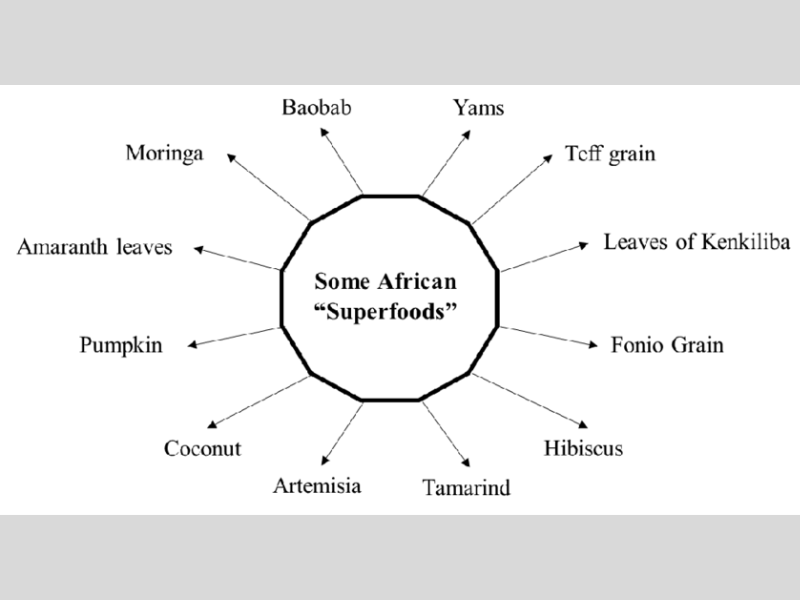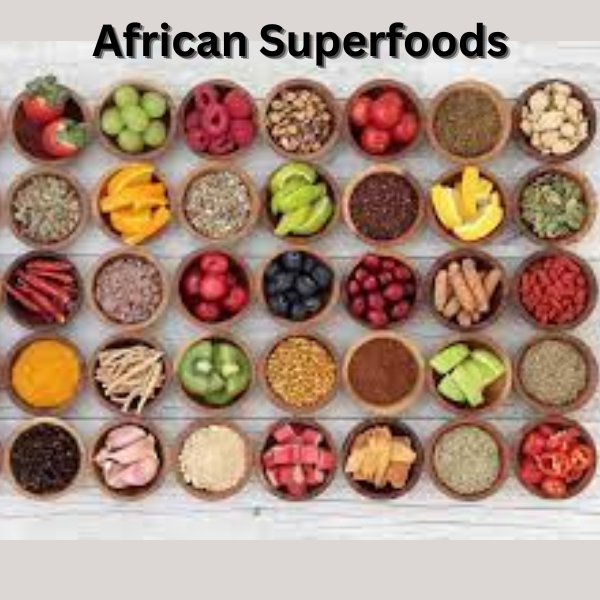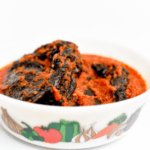Superfoods have become increasingly fashionable in recent years due to their superior nutritional profiles and health advantages. While many people have heard of blueberries, kale, and quinoa as superfoods, there is really a whole universe of superfoods just waiting to be discovered. Superfoods with numerous health advantages may be found all throughout Africa, a continent known for its diverse ecosystems and ancient traditions. The health advantages of some of the most well-known African superfoods will be discussed in this article.
Health Benefits of Different African Superfoods


Teff
For thousands of years, Ethiopians have relied on the small grain teff as a main source of nutrition. Teff is a very nutritious grain due to its high protein, iron, and calcium content. Furthermore, it is safe for those with celiac disease or gluten sensitivity because it contains no such protein.
Teff’s high fiber content makes it a useful weight-management food since it facilitates digestion, controls blood sugar levels, and makes you feel full for longer. Teff also has resistant starch, a form of fiber that serves as a prebiotic by feeding the good bacteria already present in the digestive tract and so promoting general digestive wellness.
Fonio
The ancient African grain fonio has been farmed for a very long time. It’s a gluten-free grain that tastes nutty and cooks up fluffy. Fonio is an excellent source of protein, dietary fiber, B vitamins (including thiamine, riboflavin, and niacin), iron, magnesium, and other minerals. Methionine and cysteine, two essential amino acids, are abundant in this grain, although they are scarce in most others.
The high fiber content of fonio aids digestion and keeps you from becoming backed up. In addition, its low glycemic index means it raises blood sugar levels gradually, making it an excellent choice for diabetics and those who want to keep their blood sugar levels within a healthy range.
Baobab fruit
The fruit of the Baobab tree, popularly called the “Tree of Life,” has been eaten by Africans for millennia due to its high nutritious content. The vitamin C found in baobab fruit is essential for wound healing, collagen production, and antioxidant defense.
Its high fiber content, especially soluble fiber, makes it easier to digest food, makes you feel fuller for longer, and keeps your blood sugar level steady. Flavonoids and polyphenols, two types of antioxidants found in abundance in baobab fruit, help to defend against oxidative stress and inflammation. In addition, it helps maintain strong bones and muscles since it contains minerals, including calcium, potassium, and magnesium.
Hibiscus
The hibiscus often called the roselle and the zobo, is a colorful African flower. Hibiscus calyces are traditionally used to brew soothing herbal tea. Hibiscus tea is not only tasty but also has many positive effects on one’s health. It has been associated with a lower risk of heart disease, better management of blood pressure, and improved liver function due to its high antioxidant content, especially anthocyanins.
Hibiscus tea has been proven to have modest diuretic qualities and to serve as a natural ACE inhibitor, both of which may contribute to the lowering of blood pressure. Hibiscus tea is popular due to its possible health benefits, including its ability to reduce inflammation, kill germs, and protect the liver.
Tamarind
The sour fruit of the tamarind tree, known as tamarind, is a staple ingredient in many African dishes. It is highly prized for both its singular taste and its beneficial effects on health. Vitamin C, a potent antioxidant that helps maintain a healthy immune system and reduces the risk of developing chronic illnesses, can be found in abundance in tamarind.
Its high fiber content promotes regular bowel movements, keeps you from feeling full for longer, and helps keep your cholesterol in check. Anti-inflammatory polyphenols and flavonoids can be found in tamarind. Tamarind has also been used traditionally to treat gastrointestinal problems such as indigestion, stomach ulcers, and constipation.
Amaranth
Amaranth is a type of leafy green vegetable that has been grown in Africa for hundreds of years. Amaranth among African superfoods is greatly healthy for you and packed with nutrients. Vitamins A, C, and K, along with folate and minerals like calcium and iron, are concentrated in amaranth leaves.
These nutrients aid in maintaining strong bones, eyesight, and immunity. The antioxidants beta-carotene and lutein found in amaranth leaves help to prevent cell damage and the effects of oxidative stress. Amaranth leaves are rich in dietary fiber, which helps with digestion and makes you feel full faster.
Smoked Catfish
Smoked catfish is a popular delicacy throughout many African countries since it is both tasty and healthy. Omega-3 fatty acids, necessary amino acids, and high-quality protein may all be found in catfish.
Omega-3 fatty acids assist heart health, brain function, and inflammation reduction, while protein is vital for creating and repairing tissues. Vitamin D, vitamin B12, selenium, and phosphorus are just a few of the vitamins and minerals that may be found in smoked catfish.
Catfish Pepper Soup
Africans love the spiciness and depth of flavor in catfish pepper soup. It’s not only tasty, but it’s also good for you in many ways. Aromatic spices like ginger, garlic, and chili peppers, all of which have antibacterial and anti-inflammatory effects, are commonly used to make the soup.
Together with the catfish, these spices make for a hearty and nourishing soup that helps ease the symptoms of the common cold, strengthen the immune system, and ease the digestive process.
Pumpkin Leaves
Ugwu and Ugu, both names for pumpkin leaves, are staple foods in many African nations due to their high nutritional value. These dark green leaves are loaded with antioxidant vitamins A, C, and E, which protect cells from damage caused by free radicals and oxidative stress.
The leaves of a pumpkin also contain a wealth of beneficial nutrients. People with anemia or at risk of iron deficiency will benefit greatly from their high iron content. The phytochemicals and carotenoids found in the leaves also have anti-inflammatory effects and contribute to the health of the individual as a whole.
Sorghum
Sorghum has been an important part of the African diet for ages. It’s devoid of gluten and packed with healthy carbs, fiber, and minerals. People with diabetes or who want to maintain steady blood sugar levels might benefit from eating sorghum because of its high energy content and slow release of glucose.
The phenolic chemicals found abundantly in the grain have been linked to a decreased incidence of chronic illnesses like heart disease, cancer, and diabetes. The high fiber content of sorghum aids digestion and aids in weight maintenance.
Moringa
Moringa, often known as the “Miracle Tree,” is widely regarded as one of the world’s healthiest and most nourishing plants. Vitamins, minerals, antioxidants, and amino acids abound in plenty. Among the many nutrients found in moringa leaves are vitamins A and C, as well as the minerals iron, calcium, and potassium.
Antioxidants like quercetin and chlorogenic acid are prevalent in these African superfoods, providing further defense against oxidative stress and inflammation. Traditional uses for moringa include increased stamina, strengthened immunity, and improved digestion.
Wrap Up African Superfoods
There is a plethora of health advantages to be found in African superfoods. Kabaia Foods is a well-known company that provides a variety of real African culinary items and spices. Kabaia Foods is dedicated to supplying you with products of the best quality and safety, so you can rest easy while enjoying a delicious meal. Kabaia Foods is committed to providing the highest quality, best value, and most delicious seafood, soups, stews, and other prepared foods, as well as a wide variety of skillfully prepared ingredients and spices.




